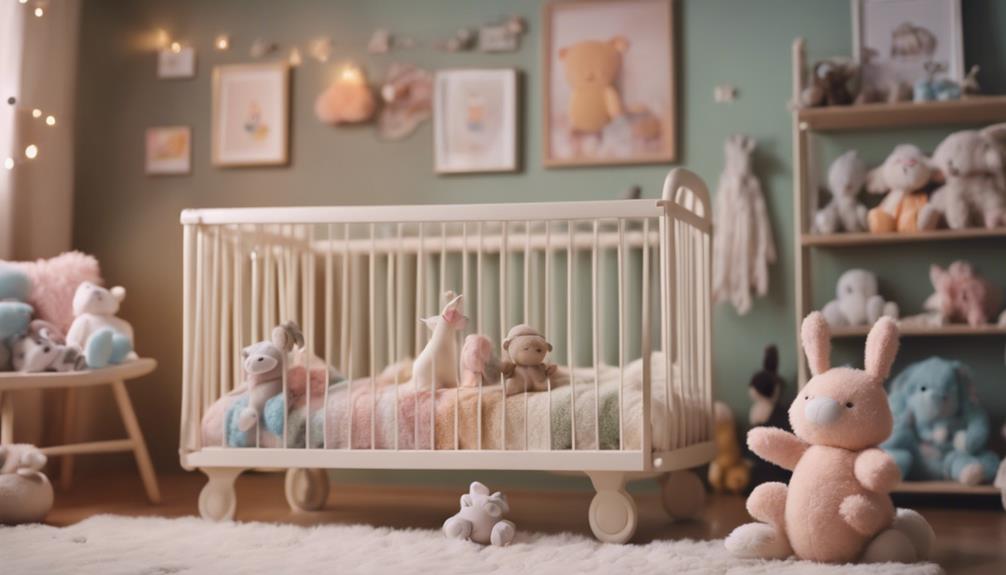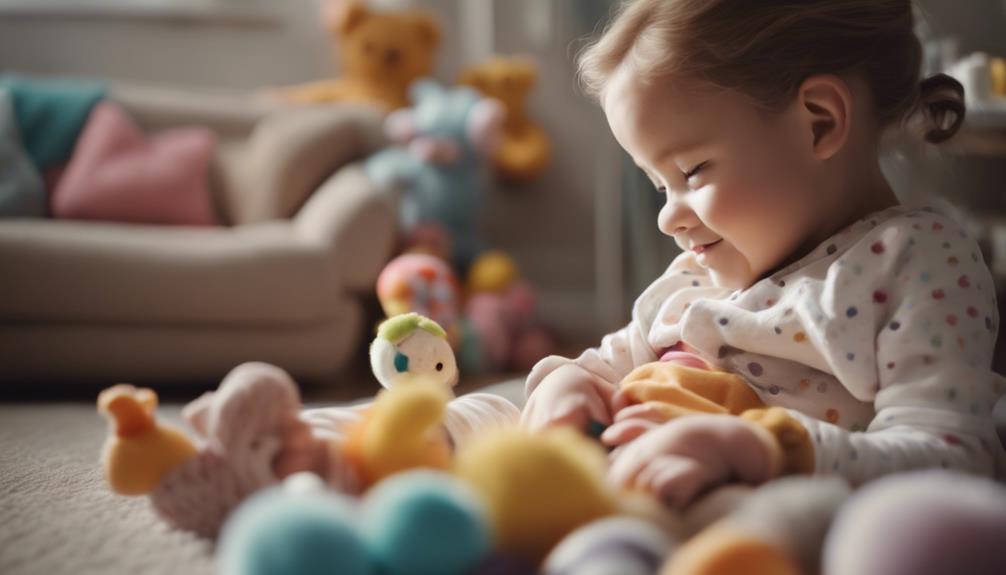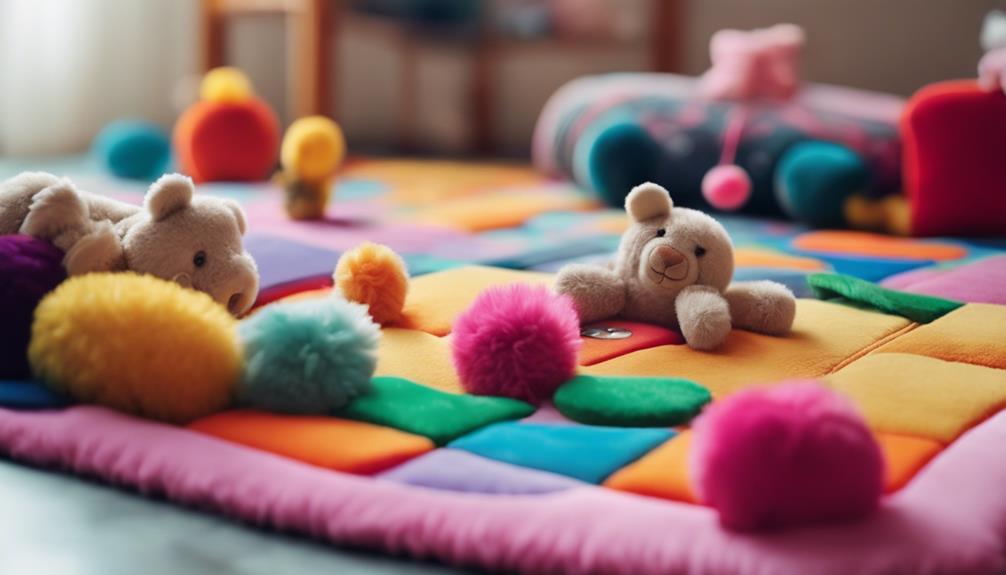For a content baby, concentrate on bonding activities like cuddling, singing, and maintaining eye contact. These interactions establish a strong emotional connection, which is crucial for your baby’s well-being and growth. Be attentive to your baby’s cues – body language, sounds, and expressions – to build trust and respond promptly. Establish a nurturing environment with consistency and positive interactions. Participate in sensory play to boost cognitive development and stimulate senses. Encourage positive interactions through play and affirmations. By prioritizing these suggestions, you can ensure a happy baby who flourishes emotionally and developmentally. Delve further to gain a deeper understanding of nurturing your baby’s happiness.
Key Takeaways
- Engage in cuddling, singing, and play for bonding.
- Respond promptly to baby's cues for trust.
- Create a nurturing environment with routine and safety.
- Stimulate senses with sensory play for development.
- Encourage positive interactions with love and affirmations.
Prioritize Bonding Activities
Engage in cuddling, singing, and playing to prioritize bonding activities and foster a strong emotional connection with your baby. Skin-to-skin contact, massages, and gentle touch also play an essential role in promoting bonding and providing your baby with a sense of security. These actions create a positive environment that's important for your baby's emotional well-being and development.
Talking to your baby, maintaining eye contact, and consistently responding to their cues are essential for building a strong bond. Through affectionate gestures and daily interactions, you can't only make your baby feel loved and secure but also contribute greatly to their overall emotional well-being and development.
Prioritizing bonding activities not only strengthens the emotional connection between you and your baby but also sets the foundation for a happy and healthy relationship.
Respond to Baby's Cues

Watch closely for your baby's signals – their body language, sounds, and expressions.
By responding promptly and consistently, you build trust and create a secure environment for your little one.
Understanding and engaging with your baby's cues is key to fostering a strong bond and ensuring their needs are met.
Observe Baby's Signals
To effectively respond to your baby's cues, pay close attention to their body language, sounds, and movements. By observing these signals, you can better understand your baby's needs, emotions, and promote effective communication that leads to their happiness.
Here are some key ways to observe your baby's signals:
- Crying: Listen to the different types of cries your baby makes to distinguish between hunger, discomfort, tiredness, or other needs.
- Eye Contact: Notice how your baby engages with you through eye contact, which can indicate their desire for interaction and connection.
- Smiling: Pay attention to your baby's smiles, as they can convey joy, contentment, and readiness for play or engagement.
- Reaching Out: When your baby reaches out towards objects or people, it may signal curiosity, a need for comfort, or a desire for exploration.
- Body Movements: Observe how your baby moves their arms, legs, and body to understand their comfort level, excitement, or need for soothing.
Engage With Responsiveness
Be attentive and responsive to your baby's cues to foster a strong emotional connection and promote their happiness.
Engaging with responsiveness is essential for building a healthy parent-child bond. When your baby makes eye contact, smiles, or uses gestures, respond promptly.
Babies often communicate their happiness through body language signals such as babbling, cooing, or reaching out to you. By showing responsiveness to your baby's needs, you not only strengthen the bond between you but also positively impact their mental well-being and emotional development.
This attentiveness lays the foundation for a happy and content baby.
Create a Nurturing Environment

Creating a nurturing environment for your baby is crucial for their overall well-being and happiness. To guarantee your little one thrives in a loving and supportive space, consider the following tips:
- Provide a safe and comfortable space: Set up a designated area where your baby can freely explore and play without any hazards.
- Maintain a consistent routine: Establishing a predictable schedule helps your baby feel secure, reducing anxiety and promoting a sense of safety.
- Engage in positive interactions: Bond with your baby through cuddling, singing, and talking to foster a strong emotional connection and boost happiness.
- Offer age-appropriate toys and activities: Stimulate your baby's senses and promote development by providing engaging toys and activities tailored to their age.
- Ensure enough rest and sleep: A well-rested baby is a happy baby, so prioritize sufficient sleep to support overall well-being and happiness.
Engage in Sensory Play

Engaging your baby in sensory play activities can greatly enhance their cognitive development and overall sensory exploration.
Sensory play involves activities that stimulate your baby's senses, such as touch, sight, sound, taste, and smell. By providing opportunities for your baby to feel different textures, listen to music, and explore various colors, you can help create a happy baby who's actively learning and growing.
Through sensory play, your baby not only experiences joy but also develops important skills. These activities promote cognitive, social, and emotional development, allowing your baby to engage with the world in a meaningful way.
Simple sensory activities like water play, textured toys, and music can bring immense happiness to your baby while offering valuable learning opportunities. Encouraging your baby to explore through sensory play is a fantastic way to support their overall development and nurture their curiosity about the world around them.
Encourage Positive Interactions

To foster a deep connection with your baby, prioritize encouraging positive interactions. It's important for babies to engage in interactive play sessions, respond promptly to their needs, and provide a loving environment for best happiness.
Here are some tips to help you create a positive interaction environment:
- Engage in interactive play sessions: Spend quality time playing games and activities that stimulate your baby's senses and promote bonding.
- Respond promptly and lovingly: Address your baby's cues and needs with care and attentiveness to build trust and security.
- Use positive affirmations: Speak to your baby in soothing tones and offer words of encouragement to foster a positive atmosphere.
- Encourage social interactions: Introduce your baby to new environments and people to promote social skills development.
- Create a loving and nurturing environment: Ensure your baby feels secure, loved, and happy by providing a warm and supportive setting.
Foster Emotional Well-Being

Promote emotional well-being in your baby by responding promptly to their cues and providing a loving and nurturing environment. Engage in positive touch, such as cuddling, hugging, and kisses, to build a strong emotional bond with your little one. Encouraging communication and interaction helps your baby feel secure, understood, and emotionally connected. By creating a safe and supportive space for your baby to express emotions, you aid in their emotional regulation and resilience. Show consistent love, attention, and affection to foster emotional well-being and overall happiness in your baby.
| Tips for Emotional Well-Being |
|---|
| 1. Respond Promptly |
| 2. Positive Touch |
| 3. Encourage Communication |
| 4. Create a Safe Space |
| 5. Show Consistent Love |
Frequently Asked Questions
How Can I Make My Baby Super Happy?
To make your baby super happy, engage in interactive games, provide lots of cuddles, and encourage exploration. Maintain a positive environment and pay attention to cues. These actions foster joy, security, and developmental growth for your little one.
What Makes a Baby Happy All the Time?
You make a baby happy all the time by responding to their needs with love and care, engaging in playful interactions, and creating a secure environment. Spending quality time together, cuddling, and exploring the world fosters their happiness.
What Can Make a Baby Happy?
To make a baby happy, focus on positive interactions, sensory play, meeting needs, spending time outdoors, dancing, reading, and showing affection. Engage with cuddles, exploration, security, music, and love. Your efforts will nurture their happiness.
What Do Babies Enjoy the Most?
You know what babies enjoy the most? It's the simple things like cuddles, playful sounds, and colorful toys that light up their world. Engage in sensory play, music, and silly games to see those smiles shine!
Conclusion
To sum up, by following these simple tips and tricks, you can turn your baby into the happiest little bundle of joy imaginable. Remember to prioritize bonding activities, respond to your baby's cues, create a nurturing environment, engage in sensory play, encourage positive interactions, and foster their emotional well-being.
With a little love and attention, your baby will be smiling from ear to ear every day. So go ahead and make your baby the happiest baby on the block!










